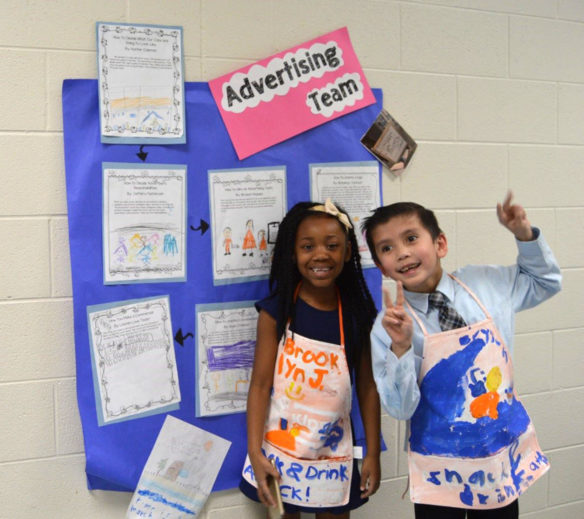
Students in Whitney McWhorter’s class at Lemons Mill Elementary (Scott County) explain the responsibilities of employees serving on a marketing team. Over five weeks, the entire 2nd-grade class at the school divided into teams, such as accounting and marketing, to create a new business. Their pop-up businesses were showcased at the school’s Exhibition Night in late March.
Submitted photo by Rebecca Powell
By Rebecca Powell
Rebecca_Powell@georgetowncollege.edu
What happens when you combine six creative teachers, 150 enthusiastic 2nd-graders and a desire for project-based learning? You get six totally amazing and highly successful businesses!
Teachers at Lemons Mill Elementary (Scott County) are not hesitant to take risks that might further student learning. Student-led projects, engineering design activities and student exhibitions have become the norm at this school. So it wasn’t unusual when early in the 2016-17 school year, the 2nd-grade teachers began designing an authentic economics project – one that would require students to learn and actually use the language and skills of economics.
With the encouragement of Principal Lori Beth Mays, the 2nd-grade team met with me, a culturally responsive coach at Georgetown College. Several years ago, I had collaborated with a kindergarten teacher to implement a classrooms business to teach literacy skills. The children visited a donut shop across the street from the school and then created their own donut business. The project engaged the students in several literacy activities, such as notetaking, writing to shareholders, filling out loan applications, writing and reading language experience and picture charts, creating signs and labels, and writing invitations to the grand opening
After reading about this project and the authentic literacy activities that occurred, the Lemons Mill teachers decided they wanted to launch their own classroom businesses. They began planning a unit that would encompass important economics concepts and vocabulary while also embedding reading, writing and mathematics standards.
But the idea of having students create their own businesses seemed a bit daunting to the teachers. Could their 2nd-graders really become so engaged in the project that it would sustain their interest over five weeks? Would their students be motivated to work independently and take responsibility for their work? Would they be able to juggle all of the requirements for establishing a business while also assuring that their students were meeting the standards in their math and language arts curricula?
It turns out that the answer to all of these questions was “yes.”
The teachers decided to begin with field trips to local businesses so students could learn firsthand what it takes to run a business. Three businesses volunteered to host them, which allowed two classrooms to visit each business. Armed with interview questions, clipboards and cameras, the young entrepreneurs gathered much of the information they would need to start their own businesses. The business owners answered the students’ many questions: What are your business goals? What makes your business successful? What advice would you give to new business owners? Do you have to work overtime?
To share what they had learned and expand their background knowledge, students created a gallery walk – where students from each classroom displayed their pictures and information from their visits for their fellow students to view. Then they set to work planning their own establishments. The target date for the “grand opening” was the school’s Exhibition Night in late March, which gave them only a few short weeks to decide on their enterprise, gather materials, create their products, build their storefronts and launch their businesses.
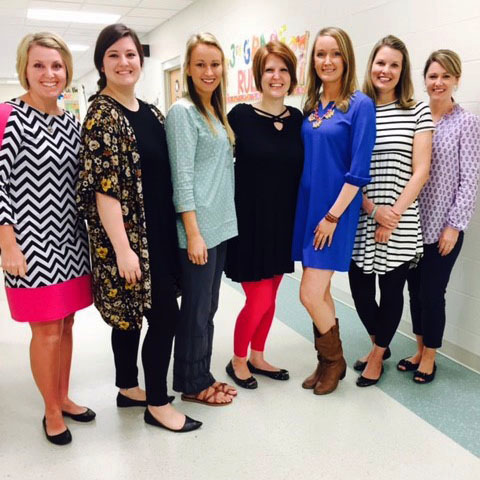
The entire 2nd-grade team at Lemons Mill Elementary participated in a project that involved students creating a business to learn literacy skills. The educators involved included, from left, Principal Lori Beth Mays, Whitney McWhorter, Mollie Wilder, Lindsay Kirk, Emily Witt, Courtney Baird and Kara Harris.
Submitted photo by Rebecca Powell
The teachers decided that the best way to approach this monumental undertaking was to develop teams: product managers, marketing team, design team, accounting team and production team. Each team would be in charge of completing various tasks, such as:
- product managers were responsible for coming up with a name for the business and for deciding how to make, package and sell the product(s);
- the marketing team developed a logo, wrote and produced a commercial and created print advertising materials;
- accounting team members wrote purchase orders, priced the products, wrote checks, kept the accounting books and calculated profits;
- the design team researched various storefronts, calculated dimensions and designed the store; and
- members of the production team made the product(s).
Students filled out job applications for the various positions and were assigned jobs based upon their top choices.
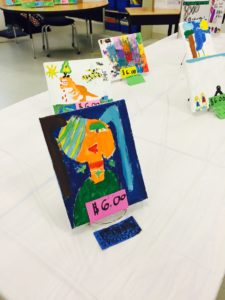
Among the many products sold at student-run businesses during Exhibition Night at Lemons Mill were child-produced art at Witt’s Little Sketchers. As part of the project, students had to research what an appropriate price would be for their goods.
Submitted photo by Rebecca Powell
Soon, the teams got to work. Letters were sent to potential “investors”– parents and friends of the school – and the funds to purchase materials began coming in. Family members and local businesses were eager to assist with contributing materials, digitizing logos, building storefronts and helping with other needed tasks. All of the workers – accountants, designers, marketers, producers – knew their jobs and had goals and deadlines for completing them.
Each day the student teams checked in with their teachers to provide an account of what they had accomplished that day and what their goals were for the next day. Teachers provided math, writing and economics lessons throughout the project. Visual displays – such as the values of coins, writing anchor charts and word walls of economics terms – could be found in every classroom.
When Exhibition Night finally arrived, the students were ready. There were bakery products to purchase in the Sweet Treats Bakeria; child-authored books at Mrs. Baird’s Magical Books; games to play and purchase in The World of Games; fish-themed snacks at the Snack and Drink Attack; toys at Kirk’s Creations; and even children’s art to purchase at Witt’s Little Sketchers. Like all good business owners, the students had conducted surveys to determine which products would be most appealing for their businesses and how they should be priced.
Teachers report that not only were their students excited by being engaged in real-world learning, but they also were able to address a number of standards in social studies, writing, mathematics and language. The following table summarizes the standards and expectations embedded in this project: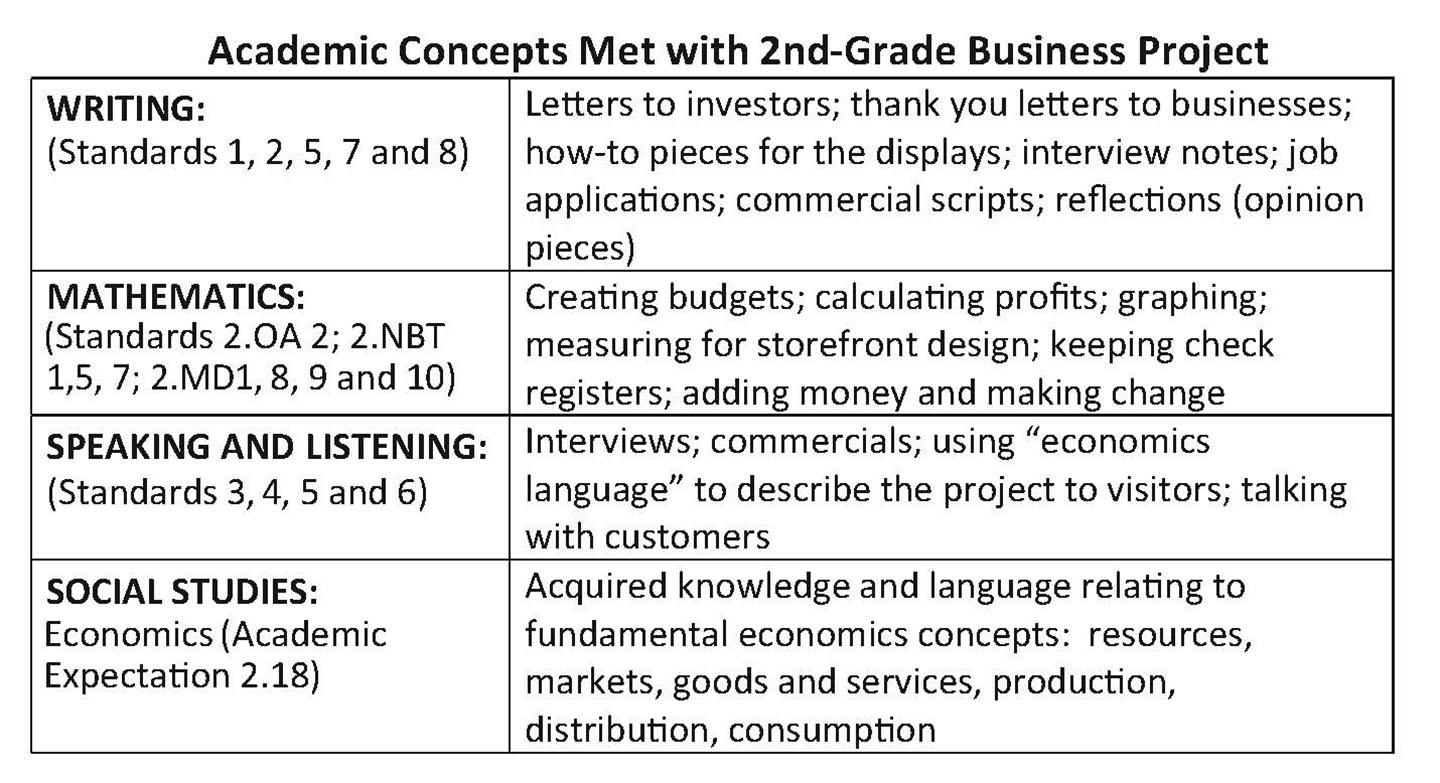
At the end of the project, teachers asked their students to reflect in writing what the project meant to them and whether they would recommend it for next year’s 2nd-grade classes. Here are a few of their comments:
“It took about 4 weeks to finish our business. I learned that starting a business was a big responsibility.”
– Braden F.
“Instead of sitting and doing a worksheet on business, we got to learn in a whole new way.”
– Abby J.
“I liked our business because we got to do it on our own and it wasn’t completely teacher directed. It was fun that we got to work on it as a group. It was fun that we got to make our own projects and decide what we were going to do with it. And I liked [that] we worked with real money!!!”
– Duncan S.
The 2nd-grade teachers felt equally positive about the outcomes. Although they admitted that their classroom businesses were a lot of work, they all say they plan to repeat the project next year. Here are some of their thoughts:
“Project-based learning has been a favorite for my students this year. Our class bakery fostered teamwork among students and highlighted students’ interests and talents, all while engaging students in real-world economics concepts. Exhibition Night was truly the highlight of our year!”
– Kara Harris
“I enjoyed seeing all of my students engaged and excited about learning. This project also helped to really build community in our classroom!”
– Mollie Wilder
“It’s amazing what children can accomplish when they have buy-in.”
– Courtney Baird
“The 2nd-grade business project really brought my students together to work as a team. The kids you would never really see work together had to learn how to communicate and talk using business lingo. I really enjoyed seeing their ideas come to life.”
– Emily Witt
Clearly, experiences like this one are not as easy to implement as paper-and-pencil tasks. Nevertheless, they are extremely rewarding, and lead to deeper and more memorable learning for all students.
If you’d like your students to start their own businesses, these 2nd-grade teachers can show you how it’s done.
Rebecca Powell directs the Center for Culturally Relevant Pedagogy at Georgetown College, a federally funded project through the Office of English Language Acquisition. She currently serves as a consultant to Lemons Mill and other elementary schools in Central Kentucky and provides on-site coaching in culturally responsive instruction.

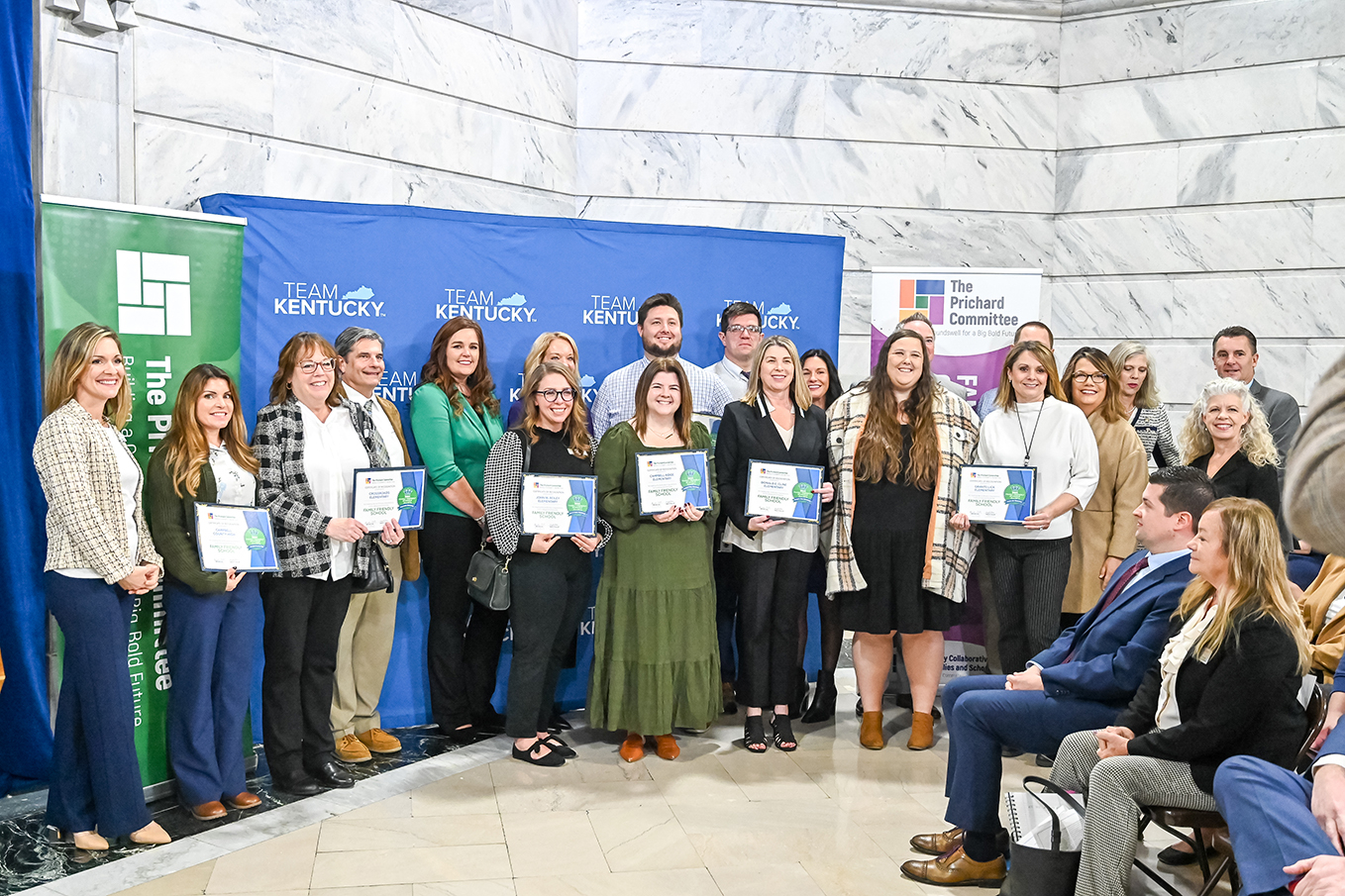
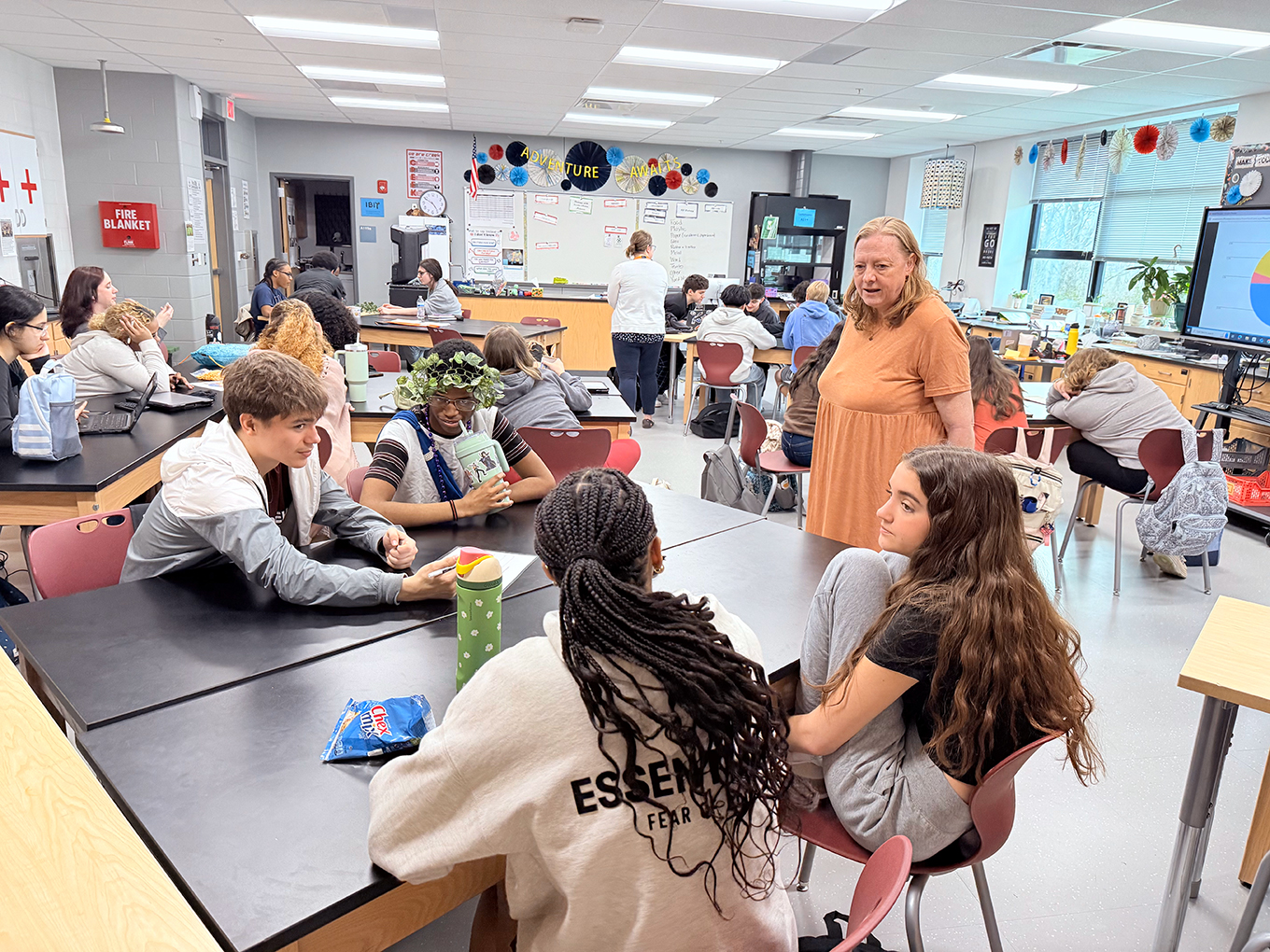

Thank you for sharing! I did this with my 4th grade class but it was a cookie business! Love educators with a mindset for project-based learning!